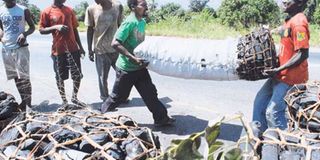TPDC plans to end charcoal menace

Villagers carry bags of charcoal. Charcoal-making has been causing deforestation at an alarming rate in Tanzania. photo | FILE
What you need to know:
The Tanzania Petrol Development Corporation will float a tender to invite qualified companies to distribute natural gas for domestic use in Dar es Salaam, Lindi and Mtwara.
The plan has come at a time when data show that Tanzania is losing nearly 400,000 hectares of trees annually basically for energy use especially charcoal making.
Dar es Salaam. The Tanzania Petrol Development Corporation will float a tender to invite qualified companies to distribute natural gas for domestic uses in Dar es Salaam, Lindi and Mtwara.
The plan has come at a time when data show that Tanzania is losing nearly 400,000 hectares of trees annually basically for energy use especially charcoal making.
According to the National Forest Resources Monitoring and Assessment (Naforma) report of the year 2015, Tanzania has 48.2 million hectares of forests equivalent to 54.6 of the total land.
The report shows that Tanzania is rich in forest resources with the volume of 3.3 billion cubic meters of natural trees, which represent a97 per cent compared to planted trees.
However, Tanzania depends on forest for energy sources by 90 per cent while electricity contributes two per cent and petrol contributes eight per cent.
Due to the ever increasingdeforestation, the TPDC has initiated a project to utilize natural gas from different sources for domestic uses.
Speaking with The Citizen recently, the Acting director for downstream department at TPDC, Mr Emmanuel Gilbert, saidapart from the ongoing project of distributing gas to the households in Dar es Salaam, the main plan is to involve the private sector through the Public and Private Partnership.
“The ongoing project is at Mikocheni, Mlalakua and around the University of Dar es Salaam where we implement the project depending on the burdget we have. However, we are still in the tenderingprocess with private companies through the Public and Private Partnership,” he says.
“It’s a $270 million (about Sh700 billion) estimated budget project, which will be implemented in three regions, which areDar es Salaam, Lindi and Mtwara for the first phase, but the target is to cover the whole country.
He says the project is expected to commence in May 2020 when qualified companies will already be identified and start working.
“There will be three companies in Dar es Salaam, which will serve Ilala, Ubungo and Kinondoni Temeke and Kigambo” says Mr Gilbert.
Adding, “We already have some specification of thecompanies, which we want to hand the projects to them. The contract time will be 20 to 25 years.”
Tanzania has 55.08 trillion cubic feet (tcf) of proven but largely undeveloped natural gas reserves, in which 47.08 trillion cubic feet is from offshore and the rest 8 trillion cubic feet are from on shore.
The main customer so far is the Tanzania Electric Supply Company (Tanesco), which takes over 50 per cent.
There are also 42 companies, which have been connected tothe gas pipeline.
Also the gas is also being distributed to households and so far there 74 houses, which have been connected in Dar es Salaam.
There is also a gas filling station at Ubungo Dar es Salaam in which some cars have changed their fuel systems from petrol to gas.
The Citizen has visited some households, which have been connected to natural gas to hear their experiences.
Angela Joseph, a resident of Mikocheni in Dar es Salaam says since she started using natural gas, she has saved a substantial amount of money which would have been used to buy costly energy sources per month.
“Before I started using gas,I was buying two bags of charcoal every month, which cost me betweenSh120,000 to Sh160,000 per month, but now I use only Sh50,000 to refill gas for two months, ”she said.
Raymond Kavishe, who is a chef at a bar at Mikocheni, says since they were connected to the natural gas system, they have been saving lots of money.
“The money I used to buy charcoal has gone down twice after being connected to the gas system,” says Mr Kavishe said.
Research officer of TPDC Eva Swillah says the gas is safe for uses compared to the petroleum gas and it is cheaper compared to other sources of energy.
“This is natural gas mined in gaseous state. It is different from petroleum gas, which is in liquid form. It is safe because it is less dense than air, so if it leaks pipe it goes up into the airwhile petroleum gas will remain down after leakage, something which can easily lead massive explosions,” she says.
She added that for the pilot project they carrying out, they cover the costs of installation and the customers will pay depending on how they use.




